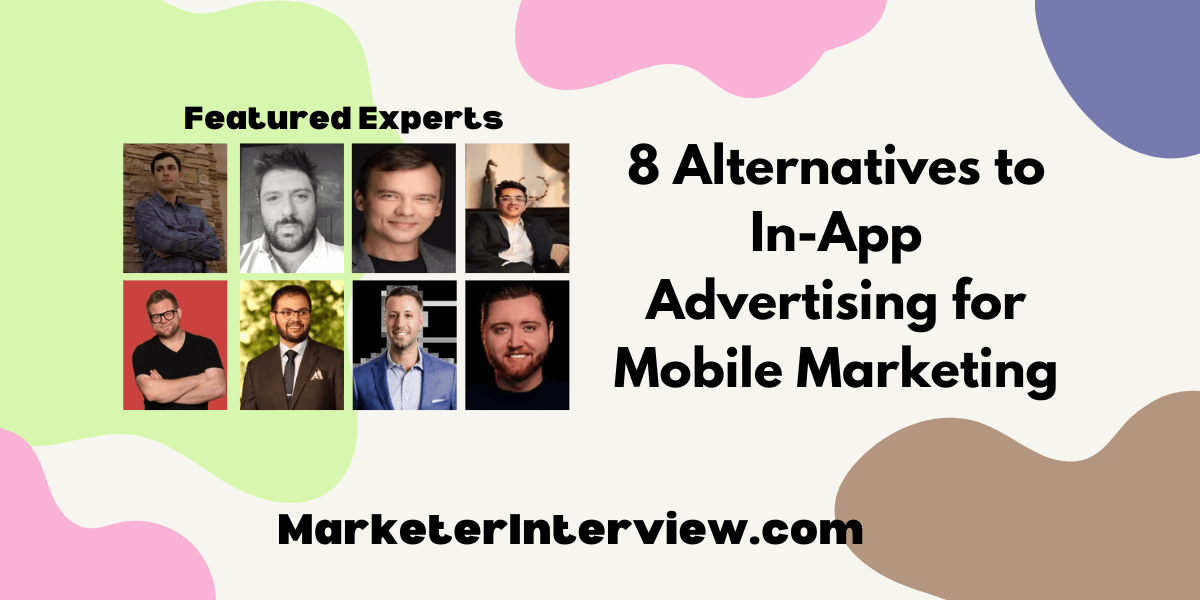8 Alternatives to In-App Advertising for Mobile Marketing
In the ever-evolving landscape of mobile marketing, we’ve gathered insights from CEOs and digital marketing experts on alternatives to in-app advertising. From exploring pre-installation channels to capitalizing on SMS marketing, discover the top eight strategies these professionals recommend for effective mobile outreach.
Want to get quoted in MarketerInterview.com content just like this? Apply to become a contributor today!
Contents
Explore Pre-Installation and White Channels
One of the most underrated alternatives to in-app advertising is pre-installation, which grants new users instant access to your app. This is achieved through agreements with mobile phone producers so that the app is already installed on new devices at the factory. This way, users see the app as soon as they first turn on the phone. As an option, users might receive a pop-up message or push notification instead, offering to install the app, which greatly increases the chance they will use it.
Another efficient approach is promotion through “white channels” such as search engines and social media. These channels provide access to lots of quality traffic and help you attract a paying audience that is genuinely interested in your product or service. Using “white channels” also contributes to higher conversion into purchases as you’re dealing with actual users, not with bots, and allows you to avoid fraud.
Avoiding fraud is actually another important issue when it comes to mobile marketing. It is essential to have a dedicated program or an in-house expert to track and root out fraudulent activity when malevolent users manipulate and steal traffic, mimicking real installs and actions. Ultimately, this makes you pay for non-existent users, leading to financial losses and incorrect analytics.

Andrew Bluemental, CEO & Co-Founder, Lemon AI
Utilize Native Advertisements
Native advertisements are a particular substitute for in-app advertising. Instead of being easily identifiable as advertisements, native ads appear to be a natural part of the app’s content. Since they don’t interfere with the user experience, I believe native advertisements are a wise decision. Things that provide a sense of belonging tend to elicit interactions from people.
Furthermore, people may perceive native ads to be more helpful than standard ones since they might offer pertinent information or deals that they find interesting. They may increase the app’s usefulness rather than be perceived as a distraction. I really enjoy that there is versatility in the presentation of native ads, as they can take on several forms such as sponsored content, promoted articles, or in-feed ads.

Kartik Ahuja, Digital Marketer, kartikahuja.com
Leverage Content Marketing
One specific alternative to in-app advertising for mobile marketing is leveraging content marketing through mobile-optimized blog posts, videos, and infographics.
Drawing from my extensive experience in the B2B SaaS industry, I have learned that high-quality, engaging content can significantly boost user engagement and brand loyalty. At Donorbox, we successfully shifted part of our marketing focus from traditional in-app ads to content marketing. By creating valuable content tailored to our audience’s needs, we were able to drive organic traffic and foster a deeper connection with our users.
Content marketing allows for more nuanced storytelling, allowing you to showcase your product or service benefits more engagingly and informatively. Educational blog posts and how-to videos, for example, can offer users insights into how to maximize the use of your app, enhancing their overall experience.
Also, content marketing is less intrusive than in-app ads, leading to a better user experience. Users trust and engage with content that provides value rather than disrupts their app usage. Thus, it’s a win-win situation.

Raviraj Hegde, SVP of Growth & Sales, Donorbox
Implement Mobile Rewards and SMS
As the CEO of a digital marketing agency, we’ve had success offering mobile rewards programs for our clients. Our agency builds custom mobile apps that offer loyalty rewards to keep users engaged. For example, we created an app for a local coffee shop that gave users a free drink on their birthday and a reward for every tenth visit. The coffee shop saw a noticeable increase in revenue in the first month from the rewards program.
SMS messaging is an underutilized marketing channel. We’ve helped clients build SMS lists and send promotional texts with coupons and announcements. Open rates for SMS are over 95%, compared to 30% for email. One client, a home services company, sent a 20% off coupon via SMS and received over 200 redemptions in one weekend.
In-app advertising isn’t the only way to monetize a mobile app. We build custom apps for clients that offer additional revenue streams like e-commerce, subscriptions, and in-app purchases. For example, we created a mobile game for a toy company that sells in-app power-ups and virtual goods. Within three months, the in-app purchases generated over $50,000 in revenue for the client.

Josh Cremer, CEO, and Creative Director, Redfox Visual
Employ Referral Programs
As the CEO of a medical marketing agency, I would recommend referral programs over in-app advertising. Referral programs incentivize your existing patients to promote your practice to their friends and family. We’ve found referral programs to yield a substantial increase in new patient appointments for our clients.
The key is to make the referral program easy to use and rewarding for patients. For example, we set up automated referral tracking and offer rewards like gift cards, discounts on cosmetic treatments, or account credits for referring new patients. Patients who refer friends tend to be very loyal, so referral programs also boost retention and renewals.
Case studies show medical practices using referral programs see an average 150-300% return on investment. The program pays for itself and then some through new patient revenue. Best of all, referrals tend to be high-quality leads since they come recommended from a trusted source.
If done right, referral programs can transform your patients into an army of brand ambassadors. They do the hard work of finding and referring new patients for you, leading to sustainable practice growth over the long run.

Jeff McGeary, Founder & CEO, PracticeVIP LLC
Engage With Push Notifications
Push notifications are an alternative I recommend. At Chappell Digital, we use targeted push notifications to re-engage clients and drive them back to our Shopify stores. Open rates average over 60%, which shows their power.
Another option is influencer marketing. We partner with influencers in various niches. When they promote our stores or products to their followers, we provide them a commission on resulting sales. It’s a win-win and generates strong ROI.
Live streaming also works. We go live on platforms like Facebook and YouTube to engage with our audiences, promote products, and build our brands as authorities. This has increased traffic to our stores considerably this year and driven significant sales.

Chase Chappell, Founder, Sirge
Capitalize on SMS Marketing
One specific alternative to in-app advertising for mobile marketing is SMS marketing. Leveraging SMS allows brands to reach users directly on their mobile devices with personalized, timely messages. In my experience, SMS marketing boasts higher open rates and engagement compared to in-app ads, making it a highly effective channel.
For instance, a client of mine in the retail sector saw a significant boost in customer engagement and sales by implementing a targeted SMS campaign. By sending exclusive offers and updates directly to customers’ phones, we were able to create a sense of urgency and exclusivity, driving immediate action. This approach not only bypasses the ad fatigue often associated with in-app advertising but also builds a more direct and personal connection with the audience.
SMS marketing also allows for precise targeting and segmentation. With the ability to tailor messages based on user behavior and preferences, businesses can deliver highly relevant content that resonates with their audience. This personalized approach not only enhances the customer experience but also increases the likelihood of conversions, proving SMS marketing to be a valuable alternative in the mobile marketing landscape.

Brandon Leibowitz, Owner, SEO Optimizers
Opt for Push Notifications and Rewards
Push notifications are great alternatives to in-app marketing. If a client has the mobile application downloaded and opts in for push notifications, they will be able to engage directly with users. You can communicate with them when you have content updates, offers, or general notifications. It enhances user engagement, as they will pop up with a catchy line of content that will pique the interest of the customer.
For example, if we were to implement a mobile app for our yachting company, and there was a special rate for renting out a yacht coming up, or an event taking place soon, or if we have a new 360-degree virtual tour visual aid uploaded onto the app, then the push notifications would alert the user to open the app and have a look. It is important that the audience is segmented appropriately so that you can send more personalized notifications to the user based on their behavior while navigating the app.
Consider rewards programs and other actions to increase engagement on the app and possible conversions.

Christos Papadimitriou, Digital Growth, IYC
Want to get quoted in MarketerInterview.com content just like this? Apply to become a contributor today!






